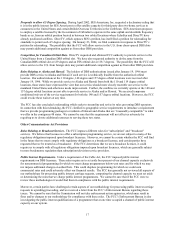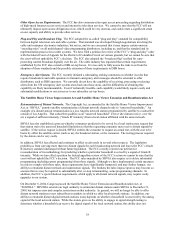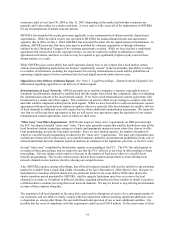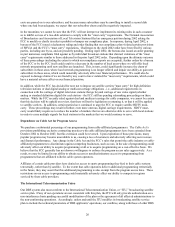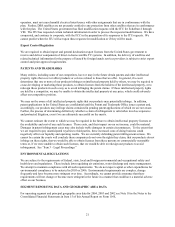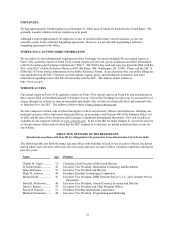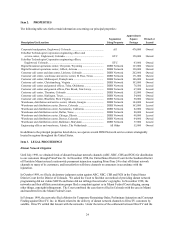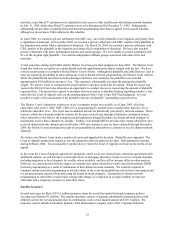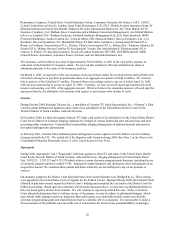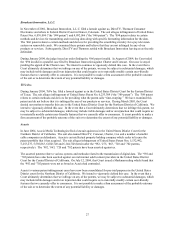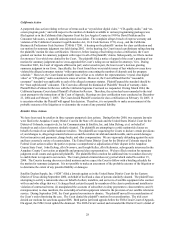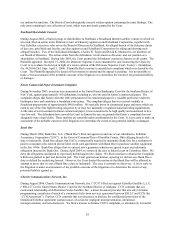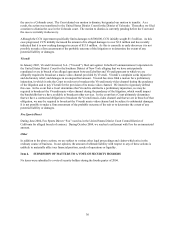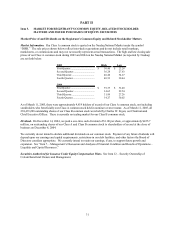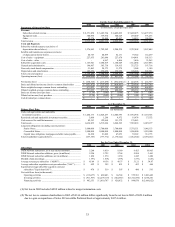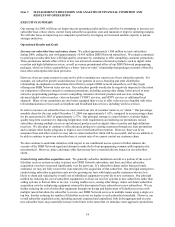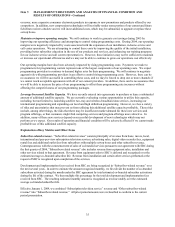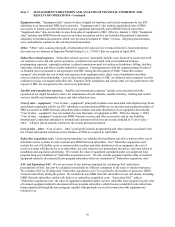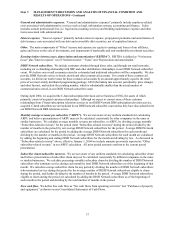Dish Network 2004 Annual Report Download - page 35
Download and view the complete annual report
Please find page 35 of the 2004 Dish Network annual report below. You can navigate through the pages in the report by either clicking on the pages listed below, or by using the keyword search tool below to find specific information within the annual report.27
Broadcast Innovation, L.L.C.
In November of 2001, Broadcast Innovation, L.L.C. filed a lawsuit against us, DirecTV, Thomson Consumer
Electronics and others in Federal District Court in Denver, Colorado. The suit alleges infringement of United States
Patent Nos. 6,076,094 (“the ‘094 patent”) and 4,992,066 (“the ‘066 patent”). The ‘094 patent relates to certain
methods and devices for transmitting and receiving data along with specific formatting information for the data.
The ‘066 patent relates to certain methods and devices for providing the scrambling circuitry for a pay television
system on removable cards. We examined these patents and believe that they are not infringed by any of our
products or services. Subsequently, DirecTV and Thomson settled with Broadcast Innovation leaving us as the only
defendant.
During January 2004, the judge issued an order finding the ‘066 patent invalid. In August of 2004, the Court ruled
the ‘094 invalid in a parallel case filed by Broadcast Innovation against Charter and Comcast. Our case is stayed
pending the appeal of the Charter case. We intend to continue to vigorously defend this case. In the event that a
Court ultimately determines that we infringe on any of the patents, we may be subject to substantial damages, which
may include treble damages and/or an injunction that could require us to materially modify certain user-friendly
features that we currently offer to consumers. It is not possible to make a firm assessment of the probable outcome
of the suit or to determine the extent of any potential liability or damages.
TiVo Inc.
During January 2004, TiVo Inc. filed a lawsuit against us in the United States District Court for the Eastern District
of Texas. The suit alleges infringement of United States Patent No. 6,233,389 (“the ‘389 patent”). The ‘389 patent
relates to certain methods and devices for providing what the patent calls “time-warping.” We have examined this
patent and do not believe that it is infringed by any of our products or services. During March 2005, the Court
denied our motion to transfer this case to the United States District Court for the Northern District of California. We
intend to vigorously defend this case. In the event that a Court ultimately determines that we infringe this patent, we
may be subject to substantial damages, which may include treble damages and/or an injunction that could require us
to materially modify certain user-friendly features that we currently offer to consumers. It is not possible to make a
firm assessment of the probable outcome of the suit or to determine the extent of any potential liability or damages.
Acacia
In June 2004, Acacia Media Technologies filed a lawsuit against us in the United States District Court for the
Northern District of California. The suit also named DirecTV, Comcast, Charter, Cox and a number of smaller
cable companies as defendants. Acacia is an intellectual property holding company which seeks to license the
patent portfolio that it has acquired. The suit alleges infringement of United States Patent Nos. 5,132,992,
5,253,275, 5,550,863, 6,002,720 and 6,144,702 (herein after the ‘992, ‘275, ‘863, ‘720 and ‘702 patents,
respectively). The ‘992, ‘863, ‘720 and ‘702 patents have been asserted against us.
The asserted patents relate to various systems and methods related to the transmission of digital data. The ‘992 and
‘702 patents have also been asserted against several internet adult content providers in the United States District
Court for the Central District of California. On July 12, 2004, that Court issued a Markman ruling which found that
the ‘992 and ‘702 patents were not as broad as Acacia had contended.
Acacia’s various patent infringement cases have now been consolidated for pre-trial purposes in the United States
District court for the Northern District of California. We intend to vigorously defend this case. In the event that a
Court ultimately determines that we infringe on any of the patents, we may be subject to substantial damages, which
may include treble damages and/or an injunction that could require us to materially modify certain user-friendly
features that we currently offer to consumers. It is not possible to make a firm assessment of the probable outcome
of the suit or to determine the extent of any potential liability or damages.


